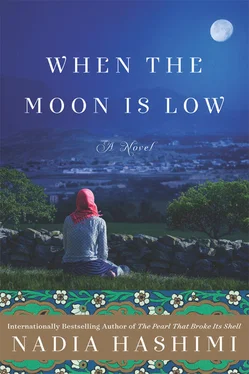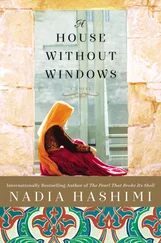He took the metro into Athens. It was a weekday and there was a chance that Roksana would drop by Attiki after school. Saleem had no other way of contacting her.
Back at Attiki Square, he told Jamal and Abdullah about being sent back to Turkey and being separated from his family. They shook their heads in disappointment, but not surprise. When he was last here, he’d felt different from these men. He’d felt above them. All that was gone. Alone, he was one of them now. He saw himself in their faces now, in their ragged clothes and in the plastic bags that held all their worldly possessions.
He slept in Attiki that night, but remembering that he would be within yards of the infamous Saboor, he stuffed his cash into his underwear and wound the strap of his backpack around his wrist. After the many lonely days and nights in Izmir, it felt good to be around people he knew and to hear the boys teasing and joking with one another.
IT WAS HIS SECOND DAY BACK. SALEEM WANTED TO SEARCH FOR food but was afraid he would miss Roksana. He sat with his back against a tree and listened to Abdullah tell stories of his childhood — spitting watermelon seeds into the stream behind his home, scaring his younger cousins with stories of djinns. Abdullah painted a picture of an Afghanistan no one would ever leave. He was only reliving the good but Saleem knew better. They all did.
And then she came. Saleem leaped to his feet at the sight of the familiar purple shirts. Abdullah burst out laughing and slapped his calves.
“Ah, the real reason you’ve come back! You think she’ll take you in and give you asylum, eh?”
“Abdullah, don’t say that. It’s nothing like that.”
Saleem was nervous. Four figures approached and Saleem held his breath. He spied Roksana, carrying a large box. Saleem walked over, when he wanted to run. He did not want to bring any more attention to Roksana for both their sakes.
He called her name softly.
Roksana’s eyes widened in surprise.
“Saleem?”
She put the box down on a bench and put a hand on his arm.
“Saleem, where have you been? What happened to you?” She looked him over. He had lost weight in the last week alone. “Are you all right?”
“Yes, I’m fine,” Saleem said, conscious of her touch. His body tensed and she pulled back. Roksana’s edge had softened. He resisted the urge to wrap his arms around her.
“Tell me,” Roksana said as she sat on a cement step. She looked up at Saleem and he took a seat beside her. His questions came first.
“Roksana — my mother. Where did she go? Did they take the train?”
They’d left the day after Saleem had spoken with his mother. Roksana had gone to the train station and recognized them, though she’d never seen them and though Saleem was not there. She’d guessed, she’d said, by the look on their faces. They looked like they were missing something. . someone. She didn’t tell him much about his mother, hiding how Madar- jan had really looked behind simple words. Roksana had helped them get onto the train to Patras, though she didn’t know anything about their journey after that. They’d left over a month ago.
“You have not heard from them?” Roksana asked.
“No. I hope they’re in England with my aunt.” He sighed.
“Can you call your aunt?”
Saleem did not have her phone number. There hadn’t been enough time or levelheaded thinking in their brief conversation for Saleem to ask his mother for the number. He had no way of contacting them, nor did he have a way of finding his family once he got to London.
Roksana wanted to know everything that had happened. Madar- jan had told her something about the police, but she hadn’t shared much more beyond that.
Saleem recounted the whole story for her while she listened intently. She bit her lip and shook her head as he described the way the police had kicked him around before letting him loose in Turkey. It felt good to finally be able to talk about it with someone like her, someone who listened and didn’t think he’d had it coming.
“Saleem, this is bad. You have to do something. You can’t get stuck here like all these other guys,” Roksana warned, her eyes on the rest of the Afghans shifting aimlessly through the park. “You need to find a better way. I wish you at least had that passport I mailed to you. I’m sure it was stolen. You can’t even trust a damn envelope to get from here to there without someone going through it.”
“It’s gone. I must go to Italy with no passport. It will not be easy.”
“No, and it’s very dangerous.” Roksana thought it over. “Maybe you can get another passport. But. . it’s a little risky.”
“A passport? From where?” Saleem looked at her curiously.
“They are costly, I think. For a European passport — maybe hundreds of euros,” she said, though she sounded unsure. “I don’t really know but some of the guys here might.”
Saleem had money and told Roksana as much.
“Keep your money hidden away, Saleem. Maybe it’s better if you don’t say anything to the boys here,” she warned, nodding in the direction of the others. “Fake papers don’t always work anyway.”
It struck Saleem that a girl like Roksana should have nothing to do with Attiki Square, a jungle of cement and weeds, framed by buildings and deceptively serene trees. Men lazed on sheets of cardboard. It looked more like a corner of war-ravaged Afghanistan than a peaceful European nation. Roksana should have run in the opposite direction but she didn’t. It was a curious thing.
“Why do you do this, Roksana?” he asked pensively. She said nothing, letting his question melt into the silence between them.
Saleem looked up at her. What did she see? Did she see his clothes or his stringy hair? Did she see a friend or a refugee case? Saleem hadn’t known what to expect from Europe, but it surely wasn’t this. He hadn’t expected to be tossed about and under threat every step of the way. If Roksana was trying to undo what had been done to him and his family thus far, there was a long way to go.
Before she could answer his question, one of the other volunteers waved her over. They needed her help.
“Where are you going to stay tonight?” The edge in her tone returned. She was back to business. “Do you want to go back to the hotel?”
Saleem shook his head. Maybe Roksana was here because he was that person who could make her feel selfless and giving. Maybe it had nothing to do with him and everything to do with her. Something bitter took root within him though he didn’t know why and he wasn’t proud of it.
“No, I will stay here.”
Roksana nodded, then stood up and brushed her backside with her hands. Saleem had no way of knowing how many times she’d asked herself the same question. Why bother to come here? Why bother doing anything for one refugee when a thousand more were on their way in?
She could have walked away from him for good. She could have lumped him in with the others. But she didn’t see him the way she saw the others.
Roksana regretted that she couldn’t tell him more about his family’s whereabouts. She’d watched the train pull out of the station, but beyond that moment, anything could have happened to Fereiba and the two younger children. Anything.
I’VE DRAGGED MY TWO CHILDREN ALONG WITH ME FROM RAIL to rail, from country to country. At each checkpoint, each customs control, I wait for the moment when we will be found out. My worst fear is the same as my biggest hope — separation from my children. I wonder if I’ll be apart from Saleem forever or if he’ll be the only one of us to make it through. Samira is a young girl, a dangerous time to be alone. Aziz is frail, a flower that will quickly wilt if plucked from the bush. I pray at some checkpoints that my children be granted asylum even if I am sent back. At other checkpoints, I pray we are sent back together. Cornered mothers pray for strange things.
Читать дальше












